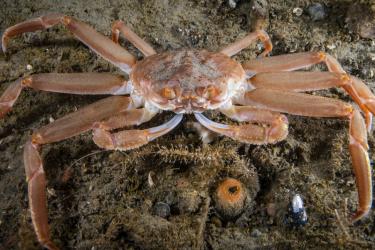The U.S. government operates under a unique relationship with tribal governments based on provisions of the U.S. Constitution, congressional legislation, treaties, Executive Orders, Secretarial Orders, and judicial decisions that recognize reserved rights of American Indians to protect their property and their way of life. The relationship between Federally-recognized Indian Tribes and the Federal government is one of sovereign to sovereign (i.e., supreme political authority from one nation (the United States) to another (Tribal Nations)) and has been described in length by the Federal judiciary and referred to in Federal law promoting Tribal self-determination and self-governance. For additional guidance, see NOAA Procedures for Government-to-Government Consultation with Federally-Recognized Indian Tribal Governments - Updated 2023 (PDF, 45 pages).
Several of the pertinent Executive and Secretarial orders and policies, listed below, describe the unique and long-standing trust relationship between the tribes and the federal government.
Indian tribes on the West Coast retain strong spiritual and cultural ties to marine and other aquatic species based on thousands of years of use for tribal religious/cultural ceremonies, subsistence, and commerce. These species include salmon and steelhead, halibut, whiting, sturgeon, lamprey, and several other species.
Many Pacific Northwest Indian tribes have treaties reserving their right to fish in “Usual and Accustomed” fishing places that include important marine and freshwater fish. These tribes are co-managers of the fisheries with the states and federal government. They participate in management decisions including those related to hatchery production, habitat conservation, hydropower, and fisheries harvest. Other tribes located along the West Coast whose reservations were created by Executive Order, also have a trust relationship with the federal government and an interest in marine and freshwater resources.
Tribal and Treaty-Reserved Fishing Rights
In the Columbia Basin and western Washington, tribal treaty-reserved fishing rights are under the continuing jurisdiction of the U.S. District Court for the Districts of Oregon and Washington in the cases of United States v. Oregon and United States v. Washington (No. 68-513 and Civ. No. 9213, respectively). In these cases, the court described the limits of state regulations of treaty fisheries and affirmed that treaties reserved for the tribes 50 percent of the harvestable surplus of natural-origin and hatchery-origin fish destined to pass through their usual and accustomed fishing areas.
In the State of California, when the United States set aside the Yurok and Hoopa Valley Indian Reservations along the Klamath and Trinity Rivers, it reserved “federally protected fishing rights to the fishery resource in the rivers running through the reservations.” For more information, see Department of Interior and Bureau of Indian Affairs Report (Sloan 2011) (PDF, 203 pages).
Presidential and Department of Commerce Guidance
- Executive Order 13175 (November 6, 2000): Consultation and Coordination with Indian Tribal Governments
- Secretarial Order 3206 (June 5, 1997) “American Indian Tribal Rights, Federal-Tribal Trust Responsibilities, and the Endangered Species Act”
- Department of Commerce American Indian and Alaska Native Consultation and Coordination Policy (Proposed)
- Department of Commerce Department Administrative Order 218-8: Consultation and Coordination with Indian Tribal Governments (April 26, 2012)
- NOAA Procedures for Government-to-Government Consultation with Federally-Recognized Indian Tribal Governments (June 2023)
Western Intertribal Organizations and Member Tribal Governments
There are 151 Federally-recognized tribes in the West Coast Region. However, NOAA would like to note that there are many other non-federally-recognized tribal partners. Most tribes have websites with valuable information about their tribe, related treaties, and the tribal government/departments. Many of the tribes also are represented by intertribal organizations.
The list below includes Federally-recognized tribes with available websites and a link to a more exhaustive list of tribes in California from the Bureau of Indian Affairs. If you are a tribe and would like to include a link to your website on our site, please contact Lalena Amiotte, West Coast Regional Tribal Coordinator, at (360) 519-4222, or lalena.amiotte@noaa.gov.
- Burns Paiute Tribe
- Coeur d’Alene Tribe
- Columbia Inter-Tribal Fish Commission
- Confederated Salish & Kootenai Tribes
- Confederated Tribes and Bands of the Yakama Nation
- Confederated Tribes of the Chehalis Reservation
- Confederated Tribes of the Colville Reservation
- Confederated Tribes of Coos, Lower Umpqua and Siuslaw Indians
- Confederated Tribes of the Grand Ronde Community of Oregon
- Confederated Tribes of Siletz Indians
- Confederated Tribes of the Umatilla Indian Reservation
- Confederated Tribes of the Warm Springs Reservation of Oregon
- Coquille Indian Tribe
- Cow Creek Tribe
- Cowlitz Indian Tribe
- Fort McDermitt Paiute and Shoshone Tribes
- Hoh Indian Tribe
- Jamestown S’Klallam Tribe
- Kalispel Tribe of Indians
- Kootenai Tribe of Idaho
- Lower Elwha Klallam Tribe
- Lummi Nation
- Makah Nation
- Muckleshoot Tribe
- Nez Perce Tribe
- Nisqually Indian Tribe
- Nooksack Tribe
- Northwest Indian Fisheries Commission
- Point No Point Treaty Council
- Port Gamble S'Klallam
- Puyallup Tribe of Indians
- Quileute Tribe
- Quinault Indian Nation
- Samish Indian Nation
- Sauk-Suiattle Tribe
- Shoalwater Bay Tribe
- Shoshone-Bannock Tribes of the Fort Hall Reservation
- Shoshone-Paiute Tribes of the Duck Valley Indian Reservation
- Skokomish Tribe
- Spokane Tribe of Indians
- Squaxin Island Tribe
- Stillaguamish Tribe
- Suquamish Tribe
- Swinomish Tribe
- Tulalip Tribes
- Upper Columbia United Tribes
- Upper Skagit Tribe
- Upper Snake River Tribes Foundation
- More information on California Indian Tribes
Contact Us
Lalena Amiotte
Regional Tribal Coordinator
NOAA Fisheries West Coast Region
Communications & External Affairs Branch
(360) 519-4222
Email: lalena.amiotte@noaa.gov


